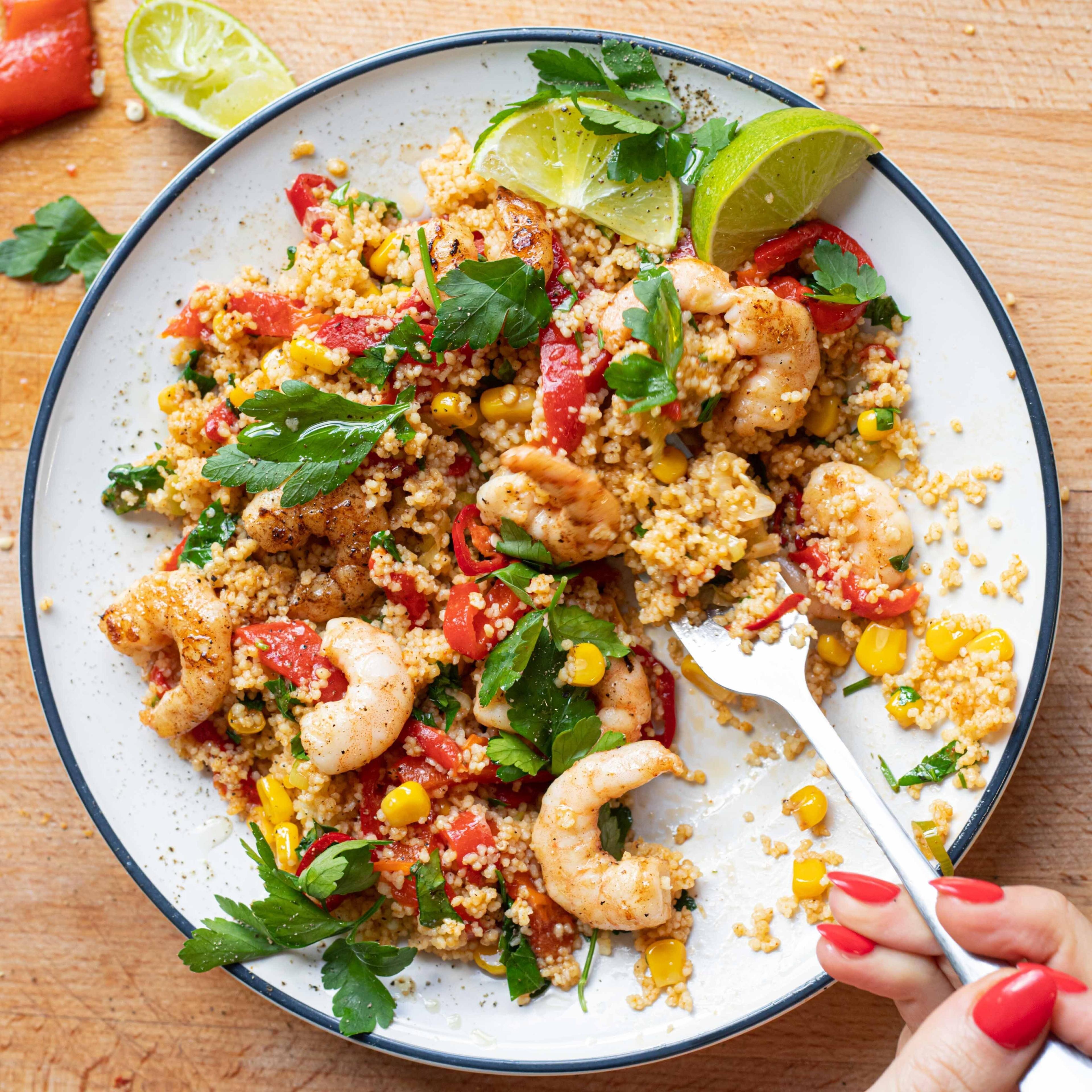What are the main health benefits of couscous?
Couscous boasts a range of health benefits, including being a rich source of protein, fibre, and essential nutrients. Its extra protein content makes it particularly beneficial for vegetarians and vegans, providing a complete amino acid profile. If you don’t know what that is: don’t worry about it. Just know it’s nice to have.
How does couscous compare to rice or quinoa nutritionally?
Compared to rice, couscous offers a higher protein content and is a good source of selenium and magnesium. While quinoa remains a nutrient powerhouse and there’s a reason everyone called it a “superfood” back in the day, couscous is more than capable of holding its own with its unique texture and flavour.
Are there gluten-free alternatives to couscous?
There are! While most traditional couscous contains gluten, gluten-free alternatives such as corn or quinoa or rice couscous are available. These options cater to individuals with gluten sensitivity or celiac disease. If you’re neither of those things, it’s worth sticking to the original.
What are some healthy ways to prepare couscous?
You only need to add boiling water to bring it to life so most of the ways you can prepare couscous are pretty damn healthy. Making sure you serve your couscous with a variety of vegetables, and use a range of herbs and spices for flavour instead of an excessive amount of salt, are other easy wins.
How does couscous fit into a vegetarian or vegan diet?
Snugly. Couscous is an excellent choice for vegetarians and vegans and can provide a pretty substantial protein source to boot. Pair it with a variety of plant-based ingredients for a well-rounded and satisfying meal.
What are the best vegetables to pair with couscous?
That’s going to depend on what vegetables you actually like, of course. We’d recommend pairing couscous with an array of colourful vegetables like bell peppers, cherry tomatoes, cucumbers, and spinach – the typical vegetables you’d expect to find paired with it in North Africa. These veggies will add a pop of colour to the beige couscous and contribute plenty of essential vitamins and minerals.
Can couscous be a part of a low-carb or diabetic diet?
Anyone out there on a low-carb or diabetic diet can feel confident in still eating couscous. The only real difference will be in making sure you moderate how much couscous you’re eating. Controlling portion sizes and balancing couscous with protein and vegetables can help manage carbohydrate intake.
How to make couscous more exciting?
You can jazz up the flavour of your couscous by adding in herbs, spices, and even citrus zest. Experiment with different seasonings to discover a combination that suits your taste buds. After all: you’re the one that’s going to have to eat it.
Is couscous a good option for heart health?
Couscous contributes to heart health due to its fibre content, which helps regulate cholesterol levels. Its decent magnesium content also supports cardiovascular function, making it a heart-friendly choice. That doesn’t mean you can skip out on going to the GP, though. Couscous should be enjoyed as a part of a healthy diet and not be seen as any kind of be-all, end-all solution.
What are some quick and healthy couscous recipes?
For a quick and healthy meal, try a couscous salad with mixed vegetables and a light vinaigrette. Alternatively, if you want to do a bit more time on the pans you can whip out a couscous stir-fry with lean protein and an assortment of colourful veggies for a nutritious and flavorful weeknight dinner.
How to use couscous in meal prepping?
You can incorporate couscous into your meal-prepping routine by preparing a big batch of it at the beginning of the week. Unlike rice, couscous is delicious cold and a great way to bulk out any lunch salads. Couscous could be used as a base for various dishes, such as salads, bowls, or sides, making your weekly meals convenient and nutritious.
Are there any whole-grain versions of couscous?
Yes, whole wheat couscous is a nutritious alternative to the traditional refined version. But don’t sweat it if you can’t get your hands on the stuff. Whole grain couscous retains more fibre and nutrients, making it a healthier choice for those looking to boost their nutritional intake but it’s not like regular couscous is terrible for you.
Can couscous be included in a high-protein diet?
Absolutely. Couscous can pretty seamlessly be integrated into a high-protein diet, especially for any vegans and vegetarians out there. Simply combine couscous with protein-rich ingredients like legumes, tofu, or lean meats for a well-balanced meal.
What are some creative couscous salad recipes?
Get creative with your couscous salads by experimenting with different ingredients. Try a Mediterranean-inspired couscous salad with olives, feta cheese, and cherry tomatoes or a citrus-infused couscous salad with roasted veggies and a sprinkling of sumac for more of a Middle Eastern vibe. The world’s your oyster.
